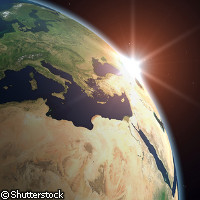Geophysicists study how atmosphere affects Earth
A new cross-disciplinary research project backed by the Austrian Science Fund has been established so that geophysicists can develop a better understanding of how the Earth's atmosphere operates. Researchers at the Institute of Geodesy and Geophysics at Vienna University of Technology (TU) in Austria will study the ways in which the Earth's atmosphere supports life on the planet, as well as how it affects it in many other ways including its gravitational field, its shape and its rotation. The project is called GGOS (Global Geodetic Observing System) Atmosphere, and has been undertaken by the International Association of Geodesy (IAG). It plans to develop geophysical models for the effects of atmospheric pressure loading, atmospheric angular momentum functions, and the coefficients of the atmosphere's gravitational potential from a collective data set. The same parameters (air pressure, temperature, humidity and wind speed) will be used for all the models, while data will be drawn from the European Centre for Medium-Range Weather Forecasts (ECMWF). The effects of the data categories and geophysical models on atmospheric phenomena will be evaluated at the Institute of Geodesy and Geophysics. Once suitable categories and models have been found, calculations will be made for the effects of atmospheric pressure loading, angular momentum functions and the coefficients of the atmosphere's gravitational potential for the entire period for which there are space geodetic observations. Many factors have to be considered in modern geodesy (the science of measurement and representation of the Earth). For example, atmospheric conditions can delay radio signals from GPS (global positioning system) satellites, and air pressure can change the shape of the Earth by up to two centimetres and can alter its gravitational force. Atmospheric forces are also a cause of small fluctuations in the Earth's rotation pattern. Because of these fluctuations, data have to be constantly adjusted. The GGOS project, therefore, has an important role to play in global atmospheric observation and measurement. Hundreds of geoscientists around the world are working on the project, which is processing and analysing geodetic and geophysical data that are currently being collected both on Earth and in space. Accurate data are essential for the measurement of atmospheric activity to observe activities such as the fluctuation in sea levels or the movement of tectonic plates, allowing for the natural disasters such as earthquakes to be monitored. Dr Johannes Böhm, a researcher at TU, said: 'Only in this way will we be able to draw conclusions which are really relevant for society, like evidence for climate research or predictions for natural disasters.'
Countries
Austria



